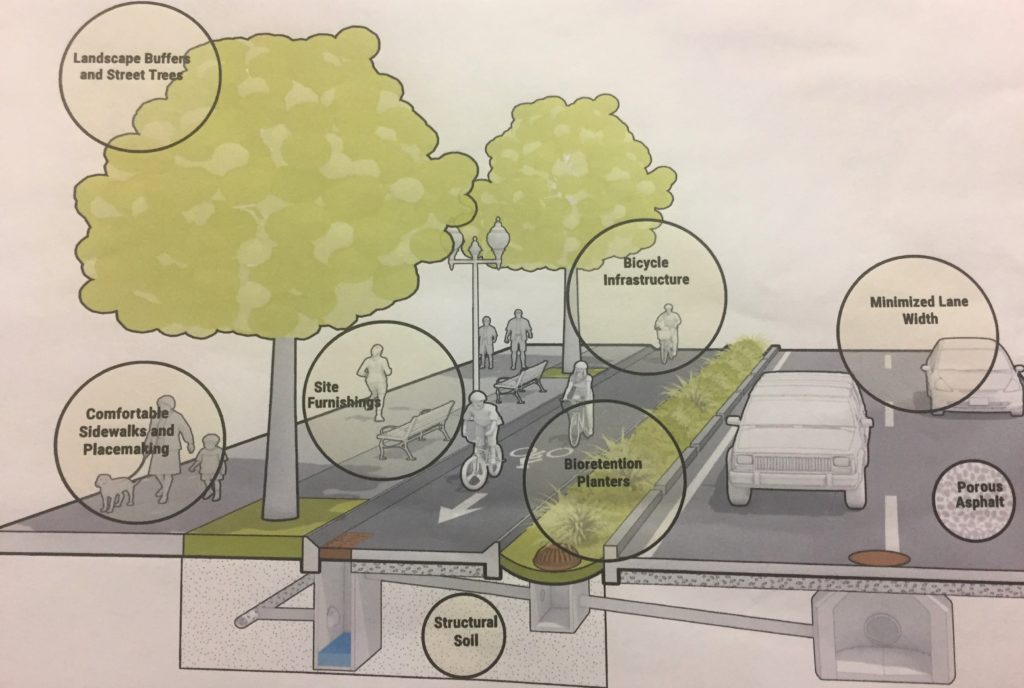Streets & Highways
Street Lights
For maintenance issues with Street Lights in the City limits visit the Duke Energy interactive map to report street light issues directly with the option to have email updates on progress.
North Carolina Department of Transportation (NCDOT) Roads
Not all roads in the city of Graham are City maintained, some are maintained by NC DOT. The map of NC DOT Roads is available here. If you have questions about NC DOT maintained roads please check out our Frequently Asked Questions section below.
For issues or concerns on NC DOT roads visit:
North Carolina Department of Transportation (NC DOT)
or
Call NC DOT at 336-570-6815.
Stormwater
Graham is among many cities across the nation that have plans and policies to reduce stormwater pollution under the federal National Pollutant Discharge Elimination System (NPDES) Phase II Stormwater Requirements. The City received its NPDES Stormwater permit on July 1, 2005 and a completes a Phase II Stormwater Annual Report.
Under the NPDES Permit requirements, the City of Graham is responsible for the quality of the stormwater that drains from property and flows into the storm sewer system and discharges to state waters. To address these requirements, the City has developed a comprehensive stormwater management program that addresses public education, public participation, illicit discharge detection and elimination, construction site runoff control, post-construction stormwater management, and good housekeeping in municipal operations.
Comprehensive stormwater management plan, updated August 2021
Stormwater Resources:
- Little Alamance Creek Healthy Streams Cooperative
- Alamance Creek Week
- Piedmont Triad Regional Council (PTRC) Stormwater SMART
- NC DENER Phase II Resources
- Stream Statistics
- Stormwater Target Pollutants
For questions or concerns about stormwater please review the FAQ’s below, send us an email using the Contact Us button below, or call Public Works at 336-570-6709.
City Streets & Rights of Way
The Street Division maintains more than 63 miles of City streets with associated curb, sidewalk, storm drains, signs and inclement weather response. To report issues or concerns see contact info below. For questions, concerns, or requests related to sidewalk, storm drain, and roads use the contact us button below to email the Public Works Director or Street Super. For information about street signs use the contact us button below to email the Sign Room and Street Super.
Public Works/Street Department
Hours of Operation:
7AM-4PM Monday thru Friday
336-570-6709 Ext. 3404
During snow, ice, or weather event…
Please do not park on the street as it slows our response and increases chance of accidents.
Other Resources
- Fee Schedule (Replacement Sign Cost)
- Standard Specifications and Details
- NCDOT Driveway Permit Manual
- NCDOT Driveway Permit Application
- NCDOT Encroachment Manual
- Please contact the Graham District Office for encroachment application questions.
The Streets and Highways division provides for the General Maintenance of over 63 miles of City streets. Not every road in the City limits are maintained, some are NC DOT maintained or private. The division is also responsible for sidewalk maintenance, street signs, pavement markings, streetlights, storm sewer maintenance as well as participating in the City of Graham Stormwater Management program.
Hours:
7AM to 4PM (Monday thru Friday)

Stormwater Smart Video
FAQ's
Some roads are State routes such as NC 87, NC 54, and NC 49. Others were existing roads maintained by NC DOT before the area was incorporated. The City Council could petition the State and accept the streets, but the additional Powell Bill funding from the State would be insufficient to maintain the road and would require additional City tax revenue to make up the difference.
It is water from rain or melting snow that “runs off” across the land rather than being absorbed into the ground. As this water flows toward the nearest low spot such as a stream, river, or other body of water, it picks up pollutants such as pesticides, fertilizers, oil, pet waste, leaves and more that can harm our water and environment. The following website has a wealth of information about stormwater runoff, issues, management and our role in reducing it visit NC DEQ
Stormwater runoff carries dirt, grime, fertilizers, oil, gas and everything else we leave on the ground into our streams and water bodies. This stormwater runoff can result in:
- Rivers, lakes, and streams that may be too dirty to fish in, or to swim in, or to drink from.
- Increased levels of fecal bacteria in the water.
- Excess nutrients in the water causing algae blooms, fish kills and increased water treatment costs.
The most visible consequence of stormwater runoff is flash flooding and the damage it brings. As land is developed, more and more stormwater runs directly to streams or rivers; sometimes more water than streams and rivers can hold. The additional water overflows and may flood streets, business, and homes. For more information, check out “Stormwater and You” or visit Stormwater Smart.
Everyone contributes to stormwater pollution problems and everyone must be part of the solution. All real property experiences stormwater run-on and runoff regardless if a drainage concern exists on that specific piece of property or not. Even if your property has never flooded, the stormwater that flows off your property must be managed so that it does not contribute to flooding or pollution in areas downstream. Whether you live in a condominium, a suburban home or in an urban setting, stormwater is an issue.
The federal National Pollutant Discharge Elimination System (NPDES) Phase II is an unfunded federal mandate that requires the City of Graham to implement a comprehensive stormwater management program. The City has implemented a fee to fund the stormwater management program. The City has implemented a fee to fund the stormwater management program to be compliant with Federal and State regulations, safeguard our community through improving drainage systems, and to improve stormwater runoff pollution of local waters.
Not all storm drain pipes are the responsibility of the City, some are, others are NC DOT, or private. If the storm drain/pipe is in the ROW of a public road it is public (NC DOT or City) if it is not, it is private (Property Owner) unless recorded in an easement or ROW dedicated to NC DOT or the City.
Drainage issues between property owners must be resolved by the property owners, or HOA in common areas.
New development sometimes causes stormwater to flow rather than be absorbed into the ground. This occurs when trees and plants are removed and/or construction and paving create impervious surfaces. The N.C. Department of Environmental Quality, Division of Energy, Mineral and Land Resources, has regulations that address this concern in specific areas of the state. Check out these FAQ’s from DEQ about Flooding.
If you live in one of these specific areas or your county or municipality has local stormwater ordinances, you may have some recourse for protecting your property. However, if you do not fall within either of these categories, your only other option may be to take private legal action. View the following Stormwater Permitting Interactive Viewer to determine the permitting authority.
Roads are evaluated by asphalt condition and traffic count. We pave worst first. If two roads are rated the same condition but one has twice as many cars per day, it will be resurfaced first.
The decision to apply brine depends on forecast before, during, and after the event. If it is forecast to start as rain, we don’t brine as the rain will wash away the brine. Depending on the forecasted temperatures, predicted accumulation, and window of time before the event we may only treat major roads and trouble spots. If the forecast is for cold temperatures before, during, and after and significant precipitation we will brine as many streets as time allows. The road may be NC DOT maintained and DOT only treats certain roads.
Not all roads in the City Limits are City maintained, some are NC DOT or Private. If you are in a new subdivision that has not had the final layer of asphalt, we cannot plow due to the water valves and sewer manholes.
Slippery snow and ice covered roads, even with tire chains are challenging to navigate increasing the chance of snow equipment sliding into parked cars. Cars parked on the side of the road also prevent crews from clearing the snow to curb, which increases return trips to clear streets to help reduce melt and refreeze which require additional trips.
